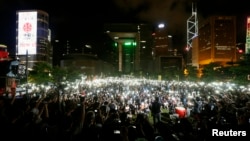Hong Kong's pro-democracy protest movement is vowing to not back down in its fight for free elections, a day after apparently conceding defeat to Beijing.
Occupy Central leaders admitted Tuesday that support from Hong Kong's people is waning. But Wednesday, pro-democracy supporters continued to rally for support.
Albert Ho, a legislator from the Democratic Party, said he thinks Hong Kong's people will rise to the challenge and fight for genuine universal suffrage.
“While Beijing’s decision makes some people very disappointed, those people who are going to Occupy Central have been ready for the worst," he said. "Meanwhile, Beijing's attitude towards dealing this issue also makes some people very angry. So I believe when the time comes the number of participants will not be less than the number we anticipated.”
Demonstration critics
Not all Hong Kong residents are happy, however, with the movement.
Lian Jinghan, an official with HK Fuchang Stocks and Securities, told VOA the vast majority of Hong Kong business people are opposed to gaining political capital through radical protest actions.
“Most of us, or from myself and the company's point of view, are not in favor of the Occupy Central movement, because this action is illegal in Hong Kong. In addition to the legal problems, what they are asking for is not very realistic. If the Occupy Central does occur, the impact will be negative on Hong Kong's overall economic environment and Hong Kong’s overall development,” said Lian Jinghan.
The group has for months threatened to shut down Hong Kong's central financial district if China does not agree to allow universal suffrage in the 2017 election for the territory's chief executive.
On Sunday, China's parliament passed legislation essentially requiring all candidates to be approved by Beijing.
Occupy leaders responded by saying the group will hold a mass protest in the coming days, but no date or place will be given because of fears this may cause disruptions to the plan.
'Spirit of resistance'
Occupy co-founder Dai Yaoting said Tuesday that support for Occupy is slipping. But he told VOA's Mandarin service Wednesday that while the movement may not reach its desired goals, its significance can not be ignored.
“The Occupy Central is a civil disobedience movement which has two parts. The first part is to change the system through some radical social actions," he said. "Now we know that it is unlikely to achieve this goal in the short term. Another goal of civil disobedience is to awake Hong Kong citizens, to let them understand the importance of democracy for Hong Kong. In terms of this part, we had a great influence in Hong Kong in the past 10 months. And influence will be further developed in the final Occupy Central Movement.”
The group has promised to continue protests and to maintain a "spirit of resistance," saying this is particularly important "when democratic reform seems unlikely in the coming years."
Under the ruling passed Sunday by China's parliament, candidates to become Hong Kong's next leader must receive majority approval from a nominating committee that likely is stacked with pro-Beijing representatives.
If, as expected, Hong Kong lawmakers block the pro-Beijing legislation when it comes up for a vote early next year, the territory will revert to the current method in which a pro-Beijing committee selects the chief executive.
This report was produced in collaboration with the VOA Mandarin service.





